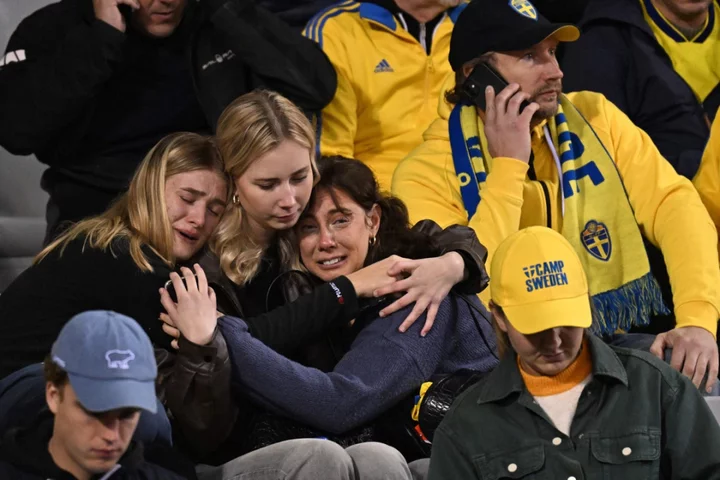
Sweden’s PM issues warning to all nationals abroad after Brussels terror attack
The killing of two Swedish citizens in an attack ahead of a football match in Brussels has shocked the country, although the government has been warning for months that Swedes were at greater risk since a recent string of public desecrations of the Quran holy book by a handful of anti-Islam activists. Swedish prime minister Ulf Kristersson on Tuesday noted that the government in August had raised the terror alert to the second-highest level following threats against Sweden by Islamic extremists. “Now we know with chilling clarity that there were grounds for those concerns,” he said. The desecrations, primarily by an Iraqi refugee living in Sweden, have sparked angry reactions in Muslim countries. In June, demonstrators in Iraq stormed the Swedish Embassy and the Iraqi government cut off diplomatic relations with Sweden. Now Swedish nationals have been urged to remain vigilant after the gunman opened fire and killed two Swedes in Brussels, with a third victim seriously injured. Mr Kristersson said he had been told by Belgium that the perpetrator “had stayed in Sweden but was not known to the Swedish police”. The European Union’s passport-free zone allowed him to travel to Sweden. The PM has called on the EU to bolster border controls and internal security, while Swedes abroad have been encouraged to download the UD Resklar app to receive updated safety alerts. The attack unfolded at 7pm when a man, who named himself in a video as Abdesalem Lassoued, opened fire in the north of the city centre. Videos shared online showed a man on a scooter, dressed in an orange fluorescent jacket, pull up and start shooting passers-by. He then chases people into the hallway of an apartment building to gun them down while four gunshots can be heard. A major manhunt was launched, with the perpetrator eventually tracked down to a cafe in Schaerbeek, after a witness recognised him and contacted the police. He was shot and later died of his injuries, with the interior minister Annelies Verlinden posting on Twitter/X, that “The perpetrator of the terrorist attack in Brussels has been identified and has died.” The gunman, who named himself in a video as Abdesalem Lassoued, is believed to be a Tunisian man who was in Belgium illegally after his asylum application was rejected in 2020. He posted a video online saying he had killed people in the name of God, with the Belgian prosecutor’s office stating their belief he was inspired by Isis. While they initially said there did not appear to be any links between the attack and the Israel-Gaza war, they later said they could not exclude that possibility. Belgium prime minister Alexander De Croo called Monday’s shooting “a harrowing act of terrorism” in a press conference, while it is believed the victims were probably targeted because they were Swedish. The attack occurred three miles away from the stadium where Belgium was playing Sweden to qualify for the Euro 2024 football tournament. Following news of the attack, the match was abandoned at half time while 35,000 fans had to wait for hours in the King Baudouin stadium before being evacuated in groups. Sweden’s foreign ministry sent a text message to its citizens in Belgium on Tuesday morning warning them to be vigilant. It later issued a statement urging all Swedes abroad to be careful. “All indications are that this is a terror attack aimed at Sweden and Swedish citizens only due to them being Swedish,” Mr Kristersson told a news conference.“These terrorists want to scare us into obedience and silence. That will not happen.” Sweden’s terror alert was raised to its second-highest level in August after a series of public Quran burnings, with the government warning that the country had become a target for jihadis. After copies of the Quran were burnt outside Stockholm’s Royal Palace, the city’s largest mosque, and the Turkish embassy, state authorities were warned by intelligence services of a heightened risk for a terrorist attack. Swedish officials have repeatedly condemned the desecrations while saying they are allowed under freedom of speech. The government is investigating whether to give police greater authority to stop such acts on security grounds.“Not everything that is legal is appropriate,” Mr Kristersson said Tuesday. “What you do in Sweden can have consequences elsewhere.” Protests occurred in Muslim-majority countries across the world, with protestors in Iraq storming the Swedish embassy and Turkish president Recep Tayyip Erdogan holding up Sweden’s NATO membership bid. Sweden’s embassies urged nationals to exercise increased vigilance abroad while Swedes at home voiced concerns about safety in a country lately also contending with a wave of gangland shootings. “The threat assessment against Sweden has gradually changed and the threat of attacks by above all violent Islamist extremism has increased,” security police SAPO said in a statement following the attack on Monday. “It is a serious situation and the security police estimates that it will remain for a considerable period.” Read More Climbers scale 142-metre tall tower in Barcelona city centre Ukraine Russia war: Putin’s forces suffer blow as helicopters destroyed - live Experts on what winter brings for the Ukraine war – and why Putin is banking on Trump Sweden captain Victor Lindelof ‘shocked and devastated’ by killing of two fans What we know about Isis Brussels terror suspect Abdesalem Lassoued Sweden fans given overnight police protection in Brussels after shooting during Euro 2024 qualifier
2023-10-18 01:21
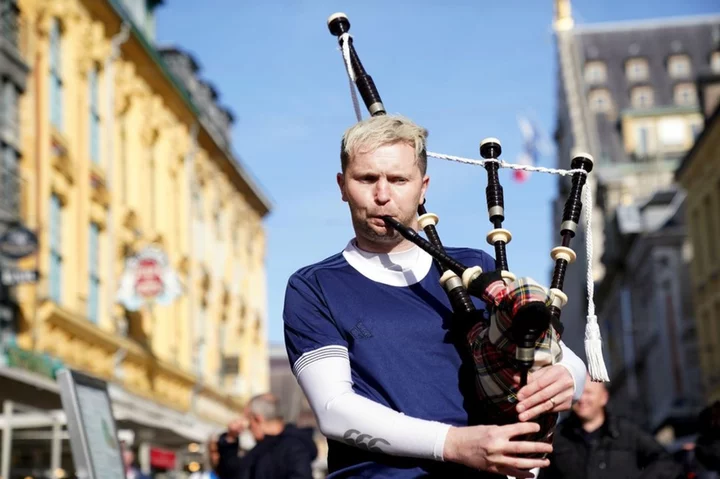
Brussels shooting: Security doubled for France v Scotland friendly
The French interior minister says it comes after two Swedish nationals were shot dead in Brussels.
2023-10-17 22:58
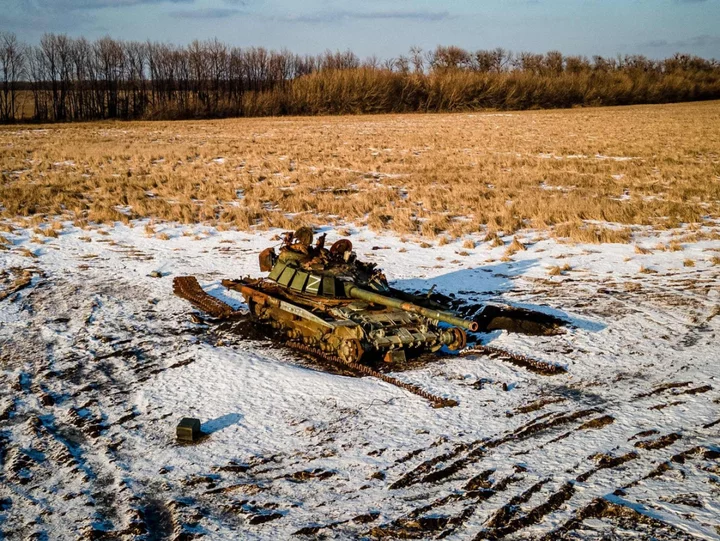
Experts reveal what the winter will bring for the Ukraine war – and why Putin will be banking on Trump
The Ukraine war may remain a “stalemate” throughout 2024, military experts have told The Independent, as hopes fade for a major breakthrough in this year’s counteroffensive against Russia. Delays in Western military aid handed Moscow time to build heavily fortified defences, which have largely held up against months of intense assaults – and constraints in ammunition and weaponry now mean both armies may struggle to sustain the current pace of the war, some analysts believe. With the prospect of a Middle East conflict likely to further stretch Washington – Ukraine’s largest backer – ahead of a US presidential election in November 2024, Vladimir Putin’s strategy may now be to preserve the current state of the frontline and “wait it out”, Western experts say. With just weeks likely left before seasonal weather changes dampen offensive efforts in Ukraine, Dr Patrick Bury of the University of Bath said: “There hasn’t been a breakthrough, there’s been tactical gains, low-level operational gains – but not strategic.” “What this summer has shown is that [Ukraine] can fight at company level [of around 100 soldiers] but when you go the next level up to the battalion, they just don’t really have the coordinated experience to fight with all the moving parts”, said Dr Bury, a former Nato analyst and British Army captain. While the US is due to start providing F-16 fighter jets next year, the sophistication of the Russian air force means Ukraine will still struggle to achieve air superiority, “and you need air superiority really to be able to free up the chance of large-scale manoeuvre”, he added. Therefore “unless there’s significant widespread packages of training, new weapons and equipment”, Dr Bury said, “it’s looking like 2024 is a bit of a stalemate” – with any significant shifts instead likely to take place off the battlefield. Agreeing that “we’re [already] seeing a stalemate now”, Dr Frank Ledwidge – a former military intelligence officer, now at the University of Portsmouth – questioned “whether any tactics would have worked against defenders who [Ukraine] didn’t outnumber three to one”. “In the most basic military algorithms, you need an attack ratio of three [troops] to one, and the Ukrainians don’t have anything like that,” he said. “So barring any significant change in that force ratio there’s no reason really now to assume that future operations will be any different.” Warning that there are “no game changers”, including F-16s, Dr Ledwidge likened the situation to the Western Front in 1917, adding: “Breakthroughs were made eventually in the First World War, but only when the Americans came in with two million soldiers.” He added: “Unless somebody has the moral courage to say ‘Ukraine is highly unlikely to retake all its land’, then this will go on.” James Nixey, director of the Chatham House think-tank’s Russia and Eurasia programme, said: “It does seem as though we’re heading towards a battle for Crimea.” While noting that Russia is “going all-in” by putting its economy and society “on a near at total war footing”, which may help address ammunition shortages, Mr Nixey said he agreed that significant changes to the situation in Ukraine will now likely “happen off field”. “Putin is banking almost everything on a Trump return,” he said, adding that the conflict emerging in Gaza and Israel – and threatening to become a wider Middle East conflict drawing in Hezbollah and Iran – means that “attention, resources and funding will be diverted now” from Ukraine. “While it’s true that the US army prepares for to simultaneous separate wars, the reality is that the pie is likely to be smaller – even if Ukraine funding is tagged onto an Israel assistance bid,” said Mr Nixey. US president Joe Biden, who recently suffered a setback in securing Congress’s approval for Ukraine aid, rejected that prospect this week, telling CBS News: “We’re the United States of America, for God’s sake. The most powerful nation in the history of the world. “We can take care of both of these and still maintain our overall international defence. We have the capacity to do this and we have an obligation … If we don’t, who does?” But agreeing that a second conflict has “certainly got the potential for stretching the US”, Dr Bury and Dr Ledwidge both believe a military stalemate in Ukraine is therefore “very satisfactory” to the Russian president. “Putin’s strategy is just to wait it out,” said Dr Bury. “Putin’s played a masterstroke here – he’s basically used a nuclear threat to slow down and salami-slice the aid to Ukraine. That’s the effect it’s had.” “Those threats were enough to make the Biden administration and the Germans were very wary” of supplying F-16s, tanks and long-range weaponry, he noted, adding: “We got there in the end, but it took time. “And that, it turned out, gave Russia time to build very good defensive lines and make their problem easier and the Ukrainians’ much harder.” Read More Russia to return four Ukrainian children to their families as part of Qatari-brokered deal Putin arrives in China on rare trip abroad to meet ‘dear friend’ Xi Jinping As the conflict in Israel rages on, the world must not forget about Ukraine ‘My body was burning’: Russian journalist’s horror journey in grips of suspected poisoning
2023-10-17 22:29
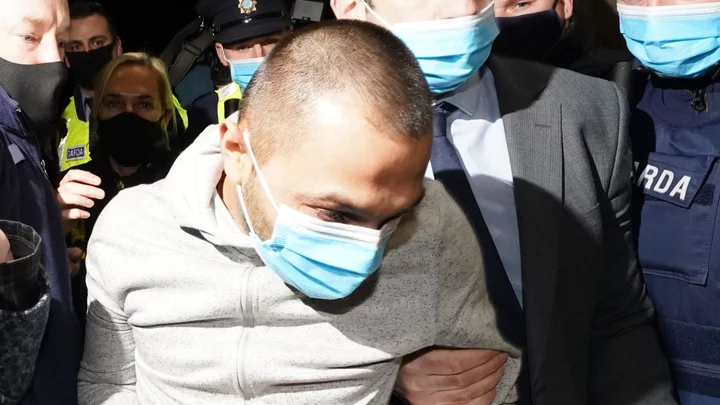
Ashling Murphy accused 'confessed', court told
Prosecutors say the schoolteacher was stabbed 11 times in the neck by Jozef Puska in County Offaly.
2023-10-17 21:18
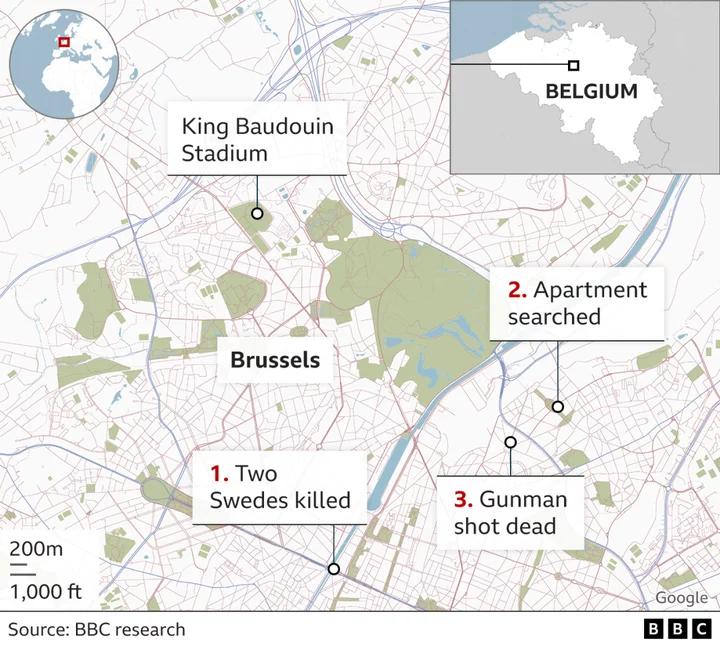
Brussels shooting: Police shoot dead attacker who killed Swedes
Two died and one person was injured in the Monday attack coinciding with a Sweden football match.
2023-10-17 20:29
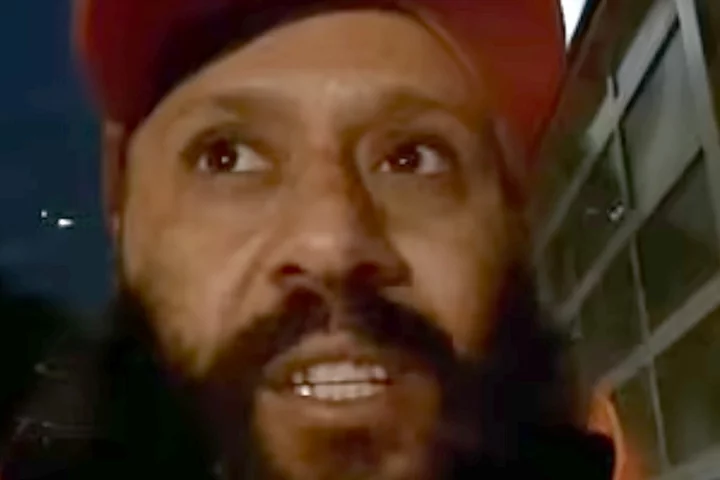
What we know about Isis Brussels terror suspect Abdesalem Lassoued
A terror suspectin Brussels has died after being shot by police in a cafe on Tuesday. The 45-year-old Tunisian man, identified as Abdesalem Lassoued, was shot in the chest and died in hospital from his wounds, local media said. Two Swedish nationals were killed in Brussels after a gunman opened fire in the city centre on Monday night ahead of a qualifier game for the UEFA Euros between Sweden and Belgium at the Heysel Stadium, some three miles away. The second half of the match was later called off. Footage shared online showed a man dressed in an orange jacket unloading several shots, using a large weapon. The bearded man was reportedly seen leaving the crime scene on a scooter. After the shooting Abdesalem Lassoued posted a video on Facebook about the killings, claiming he was a member of Islamic State (IS) and had killed “three Swedes so far”. Authorities searched for the man overnight, before finding him inside a café in the Brussels neighbourhood of Schaerbeek at 8am and ‘opened fire’. Here’s everything we know about the terror suspect: Who is the terror suspect? The gunman was named on Monday night by local media as 45-year-old Abdesalem Lassoued from Tunisia. He was reportedly a failed asylum seeker living illegally in the Schaerbeek area of Brussels, which is about a ten-minute drive from the scene of the shooting. Justice Minister Vincent Van Quickenborn said Lassoued was convicted in Tunisia ‘for common law offences’, but was not reported for a terrorist risk. Why did he carry out the attack? After the shooting, Lassoued posted a video to Facebook, using the name Slayem Slouma, speaking in Arabic: “Islamic greeting Allahu Akbar. My name is Abdesalem Al Guilani and I am a fighter for Allah. I am from the Islamic State. We love who loves us and we hate who hates us. We live for our religion and we die for our religion.” He added that he had “killed three Swedes so far” and also claimed he had carried out the attack in “revenge in the name of Muslims”. A Belgian federal prosecutor said there was no evidence that the attacker had any link to the renewed conflict between Israel and Palestinian militants. What happened after the shooting? Police in Belgium searched overnight to find the suspect who opened fire in the Brussels city centre. Footage shared online showed a man dressed in an orange jacket unloading several shots using a large weapon, before leaving the crime scene on a scooter. Police raided a building in the Brussels neighborhood of Schaerbeek overnight where the man was thought to be staying but did not find him. Authorities eventually found a suspect inside a café in the Brussels neighbourhood of Schaerbeek at 8am. He was shot in the chest before dying in hospital from his wounds, local media reported. Interior Minister Annelies Verlinden posted on X: “The perpetrator of the terrorist attack in Brussels has been identified and died.” The European Commission, which is based in Brussels, has urged staff to work from home and some schools were closed in the wake of the attack. Read More Brussels shooting live: Terror suspect killed by police after Swedish nationals murdered in Belgium Belgium shooting: Video shows moment gunman opened fire, killing two people in Brussels Sweden players take overnight flight home, start returning to clubs after shooting in Belgium How Quran burnings in Sweden have increased threats from Islamic militants Amazon, Tripadvisor and other companies team up to battle fake reviews while FTC seeks to ban them Video shows moments before gunman opened fire in Brussels, killing two people
2023-10-17 19:24
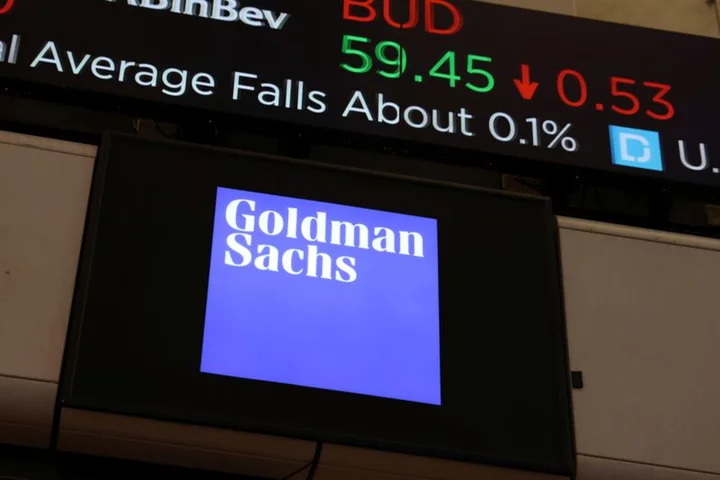
Goldman Sachs lifts Europe Inc's 2023 profit growth forecast to 3%
Goldman Sachs said on Tuesday it expects earnings for companies in the pan-European STOXX 600 index to grow
2023-10-17 17:59
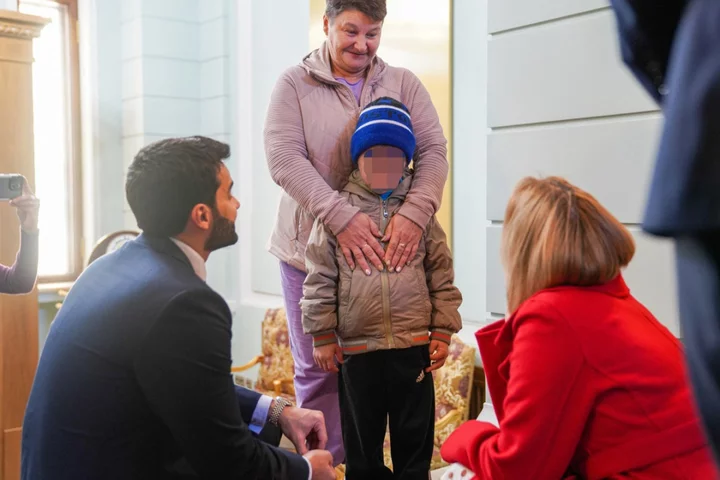
Russia to return four Ukrainian children to their families as part of Qatari-brokered deal
Four children from Ukraine are to be to be returned to their families from Russia in a deal brokered by Qatar. The youngest is two years old, while the oldest is 17. A seven-year-old boy returned to Ukraine on Monday via Estonia after he was reunited with his grandmother in Qatar's Moscow embassy last week, the official said. The two-year-old boy was handed over to Qatari diplomats in Moscow on Monday, and a nine-year-old boy and a 17-year-old girl are due to be handed over this week, the official said. The Ukrainian Presidential Office said the children would all be home soon. "We are bringing home four Ukrainian children illegally deported to the Russian Federation," Andriy Yermak, head of the presidential office, said on X, formerly known as Twitter. He gave no further details. Kyiv says about 20,000 children have been taken from Ukraine to Russia or Russian-held territory without the consent of family or guardians. It calls this a war crime that meets the UN treaty definition of genocide. Moscow, which launched a full-scale invasion of Ukraine in February last year, denies committing the accusation and says it has protected vulnerable children from the war zone. The return of the first four children tests a system the Gulf Arab state established after months of secret talks with Moscow and Kyiv, the Qatari official said on condition of anonymity because of the sensitivity of the process. Qatar's minister of state for international cooperation, Lolwah Al Khater, confirmed the mediation in a statement and described this week's repatriations as "only a first step". Russia's Commissioner for Children's Rights, Maria Lvova-Belova, shared a short initial list of Ukrainian children to be returned with a team of Qatari diplomats who verified each child's identity, the official said. It was not clear how many additional children Russia would authorise to return to Ukraine via the Qatari mechanism, the Qatari official said. About 400 children have been returned to Ukraine since Moscow's invasion, but the United Nations human rights agency raised concerns last week that there was no system to facilitate such returns. Qatari diplomats will accompany the children over the border with Estonia, Latvia or Belarus or to Qatar by chartered jet before returning them to Ukraine, the Qatari official said. "Both Ukrainian and Russian officials have been cooperative," the Qatari official said, adding that Ukraine approached Doha to mediate with Russia over the children. The seven-year-old boy reunited with his grandmother on Friday had been in Russia at a children's home "as a result of being separated from his mother who was in Russia when the war broke out", a Qatari official told Reuters. The International Criminal Court issued arrest warrants in March for Russian President Vladimir Putin and Ms Lvova-Belova, accusing them of the war crime of illegally deporting children from Ukraine. Both deny the allegations against them. Reuters reporting contributed to this report Read More The Body in the Woods | An Independent TV Original Documentary The harrowing discovery at centre of The Independent’s new documentary Russia is sending more forces to an eastern Ukraine city after its assault slows, analysts say Poland's ruling conservatives lose majority in parliament to centrist coalition, final count shows Trump scheduled to be questioned in lawsuits from ex-FBI employees who sent negative texts about him
2023-10-17 17:51
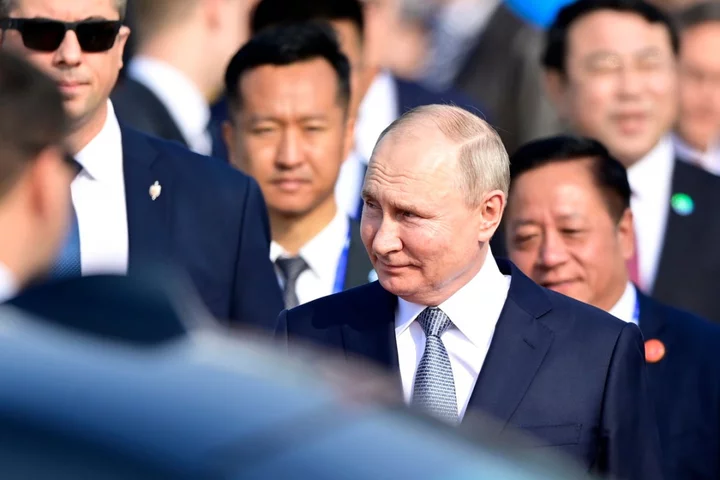
Putin arrives in China on rare trip abroad to meet ‘dear friend’ Xi Jinping
Vladimir Putin arrived in Beijing on Tuesday for a rare trip abroad to join ally China in marking the 10th anniversary of an international cooperation forum. The two-day visit is only his second known trip abroad since the Hague-based International Criminal Court (ICC) issued an arrest warrant for the Russian leader in March over Ukraine war crime allegations. The Russian president and his Chinese counterpart Xi Jinping are holding talks to bolster their shared trade and security amid Western sanctions against Moscow over Mr Putin’s invasion of Ukraine. Several other world leaders also arrived in Beijing for the Belt and Road Initiative (BRI) forum championed by Mr Xi, including Vietnam’s president Vo Van Thuong, but Mr Putin is being heralded as the talks’ chief guest. The Russian presidential entourage was greeted by Chinese commerce minister Wang Wentao after Mr Putin’s plane touched down at the Beijing Capital International Airport on Tuesday. Beijing has supported Russia in rejecting resolutions on Ukraine in the United Nations Security Council, part of Western efforts to isolate Russia over the war. China has rejected Western criticism of its close partnership with Russia in spite of the war in Ukraine, which entered its 600th day on Monday. Mr Putin is expected to hold bilateral meetings with his counterparts from Vietnam, Thailand, Mongolia and Laos on Tuesday and attend the forum’s official opening reception hosted by Mr Xi, Tass news agency reported. On Wednesday, he will address the forum after Mr Xi as the chief guest and will meet the Chinese president for talks after. Before embarking on the trip, Mr Putin said in an interview with CCTV that he had met with Xi more than 40 times so far and the two have “many fond memories”. He praised China’s ambitious BRI project and said contrary to the West’s perception, Beijing was seeking cooperation and not to “put someone under its thumb”. China launched its signature BRI project in 2013 and funded $900bn in infrastructure and other projects to connect Asia with Africa and Europe through overland and maritime routes. The project has since faced many challenges, including concerns about debt sustainability and the impact of China’s economic slowdown. Mr Putin said his meeting with Mr Xi would encompass talks on Belt and Road-related projects, which he said Moscow wanted to link with efforts by an economic alliance of ex-Soviet Union nations mostly located in Central Asia to “achieve common development goal”. This is his second visit outside Russia after his visit to Kyrgyzstan, a former Soviet republic, earlier this month. The ICC accused Mr Putin of committing a war crime by “illegally deporting children from Ukraine”. The ICC obliges the court’s 123 member states to arrest Mr Putin and transfer him to The Hague for trial if he sets foot on their territory. The Kremlin leader last visited China for the Beijing Winter Olympics in February 2022 when Mr Xi declared a “no-limits" partnership with Russia. Mr Xi met Mr Putin in March during a three-day trip to Moscow amid the Pentagon’s fears of Beijing’s potential military cooperation between the two countries for supplying weapons to be used in Ukraine. They greeted one another as “dear friend” when they met in the Kremlin, and held informal talks for over four hours. Read More Russia mounts ‘intensive’ offensive to break ‘powerful’ Ukrainian defences in Kupiansk-Lyman Ukraine-Russia war – live: Putin suffers serious losses in largest offensive in months Viral hate and misinformation amid Israel-Hamas crisis renew fears of real-world violence
2023-10-17 17:48
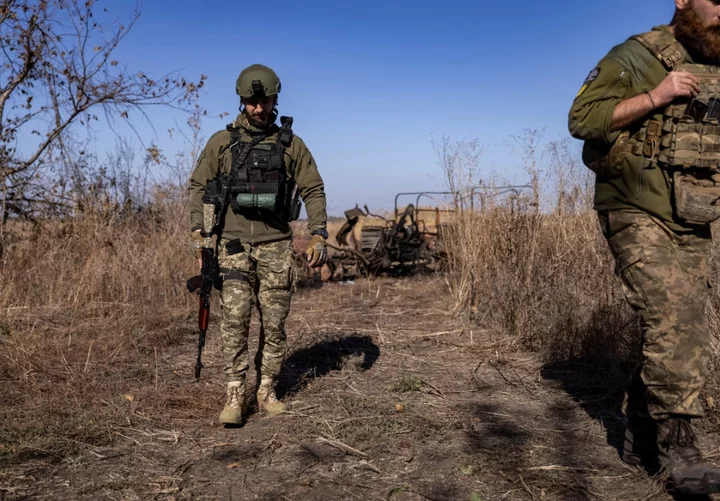
Ukraine-Russia war – live: Putin’s latest assault weakens as Moscow denies accepting North Korea weapons
Russia has lost 127 tanks, 239 armoured personnel vehicles (APVs) and 161 artillery systems in a week, Kyiv has said as Vladimir Putin launches a sustained assault in the east of Ukraine. Moscow’s forces lost eight tanks, 25 APVs and 33 artillery systems in the past day, Ukraine’s General Staff said on Sunday. The Independent cannot independently confirm Kyiv’s numbers which come after Putin claimed Ukraine‘s counteroffensive “completely failed”. “As for the counteroffensive, which is allegedly stalling, it has failed completely,” Putin said in video remarks posted to social media by a Kremlin journalist Pavel Zarubin. Russia currently controls about 17.5% of Ukrainian territory and a four-month-old Ukrainian counteroffensive this year has resulted in almost no net territorial gains. Read More Russian attacks kill six in Ukraine as Kyiv ramps up drone counter strikes Russian governor reported to police for speaking out over Putin’s ‘unnecessary’ war against Ukraine Ukrainian forces release video of downed Russian Mi-8 helicopter: ‘It burns beautifully’
2023-10-17 16:26

Rolls-Royce to Cut 2,500 Jobs as CEO Extends Efficiency Drive
Rolls-Royce Holdings Plc said it’s cutting as many as 2,500 positions and will streamline the business, enacting the
2023-10-17 14:58

Ericsson Says Weakness Persists in Quarter After Sales Miss
Ericsson AB said market weakness that has depressed sales will persist into the fourth quarter as the company
2023-10-17 14:20
